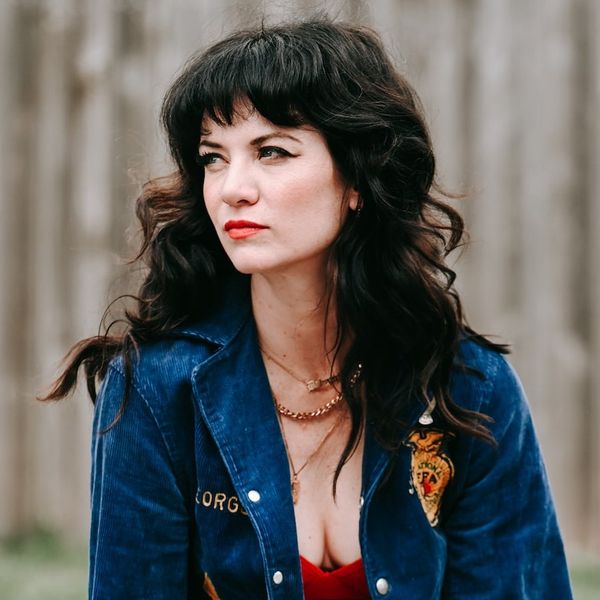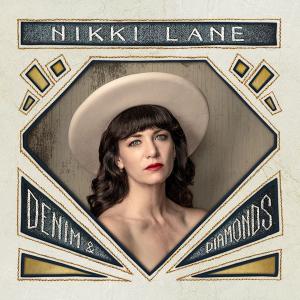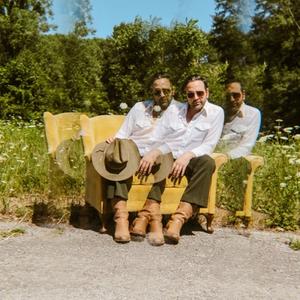




Link copied

Nikki Lane isn’t considering retirement, but if she never released another song again, she’d be happy with her new album, Denim & Diamonds, being the final word. “I don’t not wanna make other records,” she explained in a recent conversation with Holler, “but if this one doesn’t go well, you got my best shit. I gave it all to ya.”
Denim & Diamonds is Lane’s fourth full-length release, and the first album she’s put out since dropping 2017’s Highway Queen. During her decade-plus making records in Nashville, she established herself as a bastion of the Music City community. She has earned recognition at the Americana Honors & Awards and the Ameripolitan Music Awards, toured with mainstream country-adjacent Texas road dogs Midland and even opened her own vintage storefront, High Class Hillbilly, in the city.
Meanwhile, she’s never been content to stay within the annals of Music Row: her collaborating partners include Lana Del Ray, Dropkick Murphys’ Ken Casey and now, on Denim & Diamonds, Queens of the Stone Age frontman Josh Homme, who played guitar and drums and headed up its production.
Lane’s story has always embraced contradiction. She is a stubborn punk rocker who is also a savvy businessperson, a Nashville traditionalist who also sees the good in a developing city, a pavement-pounder with a “work smarter, not harder” mentality, a rootsy performer with a thick rock streak. Denim & Diamonds brings those contradictions to a head. The collection represents Lane’s hardest, grungiest sound to date, but it also accesses a side of her that’s rawer and more vulnerable than any she’s shown before.
The singer says that’s because, all these years into her career, she’s still learning.
“When I was younger I thought I knew everything,” she relates. “And I’m happy to not now, because it’s allowing a lot more opportunity to say, ‘What do you think?’ I don’t have to take that advice. That’s the thing I didn’t know when I was younger. Just ask. And in doing so, I was really happy with the way it lent to this record but I think it also set a tone for the way I want to approach things in the future.”
Read on as Lane explains the album-making process behind Denim & Diamonds, why she doesn’t regret taking five years between records and how the Nashville community has shaped her career trajectory.
How did you come to work with Josh Homme on Denim & Diamonds?
My previous manager actually suggested it. I was in a dry spell creatively. I didn’t know who should make my record, when I should make one, if I wanted to tour as aggressively as I had been - I was just not in a spot that was fruitful.
There are five guys you call in Americana, and I had already talked to most of them. Frankly, I’ve made records with half of them. So I was just like, “God, you know, what’s the other thing?” But I will say, I know I wouldn’t have called Josh. When my manager suggested him, it seemed like a stretch. My immediate reaction was, “I hope he takes the call.” And then I realized how much we had in common in terms of approach to creativity.
This album, overall, feels a little world-weary. You have several lyrics that pull back a tough exterior layer to reveal a lot of tenderness, and even exhaustion from spending so much time on the road. At the same time, Homme definitely drew out the more hard-edged, rock side of your sound. Can you talk about that juxtaposition?
I was always telling the truth, but this was the first time I was, like, honest. I brought something forward that I probably would have been timid to do without Josh. How funny that it was my work with the most dominant character in the most aggressive sounding music where I was able to bare something.
That’s been my approach to life: I’ve always been the toughest. And there was something on Denim & Diamonds where I was like, “Okay, honestly, I don’t need to have pants on every single night just in case we need to change a tire. You change the fucking tire.” You know what I mean? For so long, I had to carry the ball.
How has that more vulnerable approach changed your live show?
I’ve been joking on tour ahead of a song called ‘Pass it Down’, where I’m talking about community. That song sounds like church, but church didn’t quite work for me. It sounds like AlAnon, but I didn’t need that forever, although AA is what my dad needed. You start to think about the fact that it’s all basically community, and I like to make a joke that when I got into the motorcycle crew, that’s when I met the guys with the most feelings.
So much of a tough exterior was built in a person to shield them from pain. Once I realized that a lot of people are feeling like I feel, I didn’t have to bullshit anymore, and that was a relief point.
You mention the word community - what about the community of Nashville? You’ve been part of it for such a long time.
Like anything where community also has a commercialization element, it can become an overgrown high school. Because even if we’re not trying to compete, we’ve all run up and grown up along each other, so there’s a lot of personal history.
As the city grows and we get upset about the loss of historic places - which I am upset about - we also gain a lot more diversity in the sense of who’s coming here, right? So I really like to see the growth, to some degree, even though it bothers me, too. And for me, I like to go to the American Legion, or Robert’s on a Sunday - it’s where the authenticity can still come and rally.
And while the places change, the people are still the same folks you have so much history with.
In terms of people that I can call on musically or for advice on staffing, creative decisions, whether or not I want to tour anymore - 90 percent of those people are just right here in Nashville. And it’s because of that same shit: the personal history. Knowing all the baggage.
Those are the people I can count on for the truth. The more you become a character or a name, the more you need those people. Community bleeds into dysfunctional family, but it’s ultimately who you’re gonna roll with, who’s gonna be in your same story line. It’s a small group of people, but it’s a blessing, just to know a couple hundred people that are following your trajectory.
It’s hard for me not to think there’s a modern-day Heartworn Highways being written in this town. I think of Sierra Ferrell, Paul Cauthen - those are fucking legends, I don’t care what you say.
Speaking of Heartworn Highways - I’ve heard you referred to as a modern-day Nashville “outlaw”. How do you feel about that descriptor?
I think I really like it, and the reason why is that it is a descriptor, and what people are seeking is a common vocabulary. I used to be called Americana, and that was a little hard for me, because what happens? I cuss too much to be around them. Outlaw obviously is ultimately a revivalist term that refers to a genre that was here. But it’s the closest representation of the people I wanna be rolling with currently.
But the more we seek for those terms, the more I kinda want all of it. You know what I mean? I want people that are on the fence about country, or on the fence about rock ‘n’ roll, to get it. In that way, I’m definitely a hipster, and I’m definitely Americana, and I hope that you think I’m a little bit punk rock. But if it’s one of those things that helps people understand that I’m not quite mainstream, then I’m fuckin’ outlaw, baby.
Working retail and collecting antiques has always been an aspect of your artistry and your place in the community of Nashville, so much so that you’ve got a vintage shop, High Class Hillbilly, and a new merch collection out in partnership with Slow & Low Rye Whiskey Old Fashioned. Why is it important to you to keep that work as a prominent part of your career?
It started because that was my background and that’s what I thought I was going to pursue professionally. And then when I became a musician, frankly, the store was a way to subsidize my lifestyle. I went from a real job to no job. Some of the people in my crew were like, “Let’s just get a storage unit” - things that I knew would make me emotionally unstable, just to have no home. I was like, “Yeah, right.” So I fought to keep those things, and in so doing, I created a brand.
What I know now is that it’s all artistic expression to me. From all the antiques I haul home to the stuff I try to flip. It’s fun for me. Where it lands in the branding world with someone like Slow & Low is that in order to throw a big net, I want to find more fans that are really into my kind of stuff.
When you’re able to partner with brands that naturally have your aesthetic and same target audience, it’s real. It’s easy to do without feeling like… I guess the term in the early 2000s would have been ‘sell-out’. Well, I also still wanna eat! But at the end of the day, I don’t wanna pretend to do anything.
Between touring, making music and your retail and brand partnerships, will there ever come a point that you want to slow down?
Pff, no. I told my mom, the best thing Elvis ever did was pretend to retire. Like, how are you gonna reallocate all those hours? Because it’s my mind that’s running all of this. I can’t slow it down. All I can do is get it stoned and try to tire it out by doing all the creative stuff. I’m a businessperson, but it’s not that I’m not an artist, it’s just that when I’m done with my art, I think, “How much is that gonna make? And when am I gonna need to make art again to do all the things I’ve got going?”
It's deemed a really bad idea to wait five years to put out a record. There’s pressure to put it out. And then sure enough - by accident - it took me five years. And sure enough, I’m still making money - kind of more money - and sure enough, everything’s fine. All I know now is that I don’t have to make records to eat.
I think that means I can just focus on cool things I wanna do that maybe don’t require the live show, so that I can do live shows less frequently - not not tour, but just not run myself into the ground. I’m trying to do that work smarter, not harder thing while also still pursuing all these impulses: writing a song, opening up a hotel lobby, whatever it is. It’s really just a creative mouse wheel in here.
---
Denim & Diamonds is out now via New West Records.





